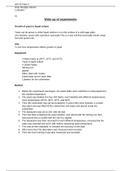Answers
unit 15 Task 2 Unit 15 - Microbiological Techniques
- Course
- Institution
unit 15 Task 2 Unit 15 - Microbiological Techniques (THIS WILL SHOW UP IN THE MARK BOOK AS PLAGIARISM AND YOU WILL GET EXCLUDED OUT THE COURSE) THIS WORK IS MEANT TO BE AS A REFERENCE OR GUIDANCE FOR YOU'RE WORK PLEASE RESPECT MY WORK AND MAKE SURE YOU GIVE ME CREDIT OR PUT IT IN YOU'RE OWN WORDS T...
[Show more]



